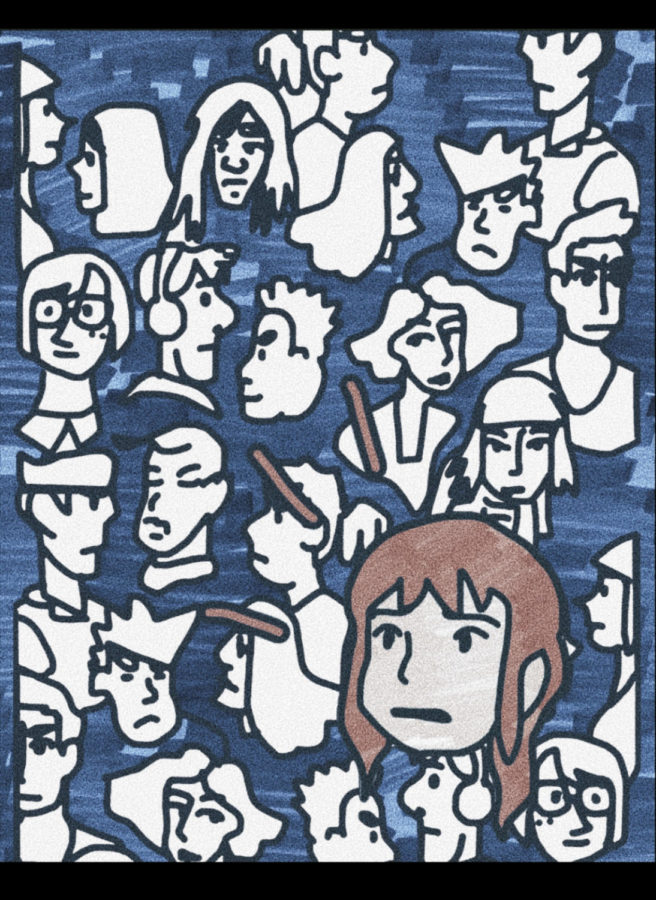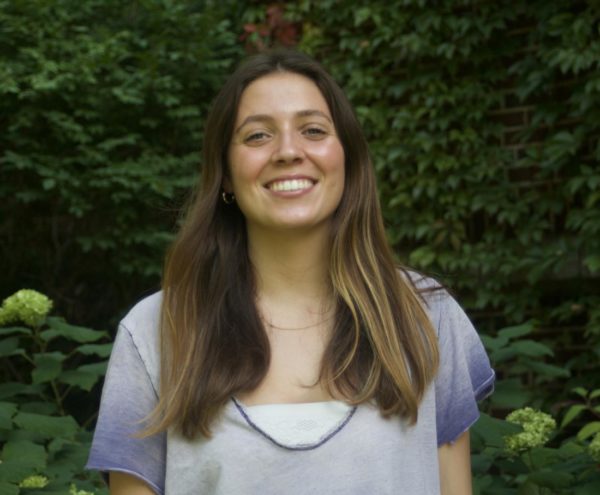Underclassmen reflect on first month of in-person learning
Prior to the COVID-19 pandemic, the stereotypical fears of high school freshmen often included the intimidating upperclassmen, getting lost on the first day, being assigned overwhelming amounts of homework, and the so-called “freshman beat-down day,” a fictitious event held by immature seniors in which freshmen are targeted.
Coming out of months of isolation, the dreaded aspects of returning to school have increased and now apply to not only freshmen but sophomores as well.
While some students appreciated parts of remote learning, others struggled with a lack of routine and conventional schooling.
“I feel like the teachers relied too heavily on videos and PowerPoints, and I was not able to form connections with my teachers and classmates because everyone was working individually with their cameras off,” says sophomore Finn Pollard.
However, some students cite aspects of remote learning that they miss, such as leaving class early, having the freedom to sleep in and being able to attend classes from wherever best fit their needs and wants.
At the end of last year, some sophomores chose to take advantage of the hybrid option, as they believed it would better prepare them for the current 2021-2022 school year.
“I did go in for hybrid learning whenever I could, but it didn’t live up to my expectations. It was still on Zoom, just while sitting in class with a mask on,” Pollard shares. “Also, the largest number of students in any of my classes was me and three others, so it wasn’t anything like real classes. The only benefit is that I got some idea of the school’s layout.”
Many freshmen — who experienced their final year of middle school virtually — expressed how different high school was from middle school. Some current freshmen express that even in the first few weeks the highschool environment is already much more serious.
“Personally, I feel a lot more motivated and more productive when I actually have standards to meet and it’s not just an easy A,” freshman Sienna Thomas says.
For students whose only high school experience has been virtual, the transition to a full in-person school year has caused challenges for some, especially in regards to academics.
“[Teachers have] been jumping right in, which honestly, I was not expecting,” sophomore Francesca Swinand says. “I’m already failing a class, and it’s my easiest class. I think it’s because I’m so used to e-learning, and I think I can slack but, really, I cannot.”
Despite the fact that some sophomores feel as though the teachers are getting right into the swing of things, this year’s freshmen may have less pressure on them compared to older grades.
“I know my humanities teachers changed the way they’re doing grades, which is kinda weird and hard to explain, but it makes it easier,” freshman Imogen Eyler says.
While getting used to the various challenges of in-person school in the classroom, some underclassmen have expressed a stark contrast in maturity since the last time they attended school fully in-person in the March of 2020, helping them with the transition.
“Maturity wise, I think [myself] and a lot of my friends have become more responsible as we’ve figured out that we’re in high school and can’t play around as much,” says Thomas. “I’ve also learned how to manage my time correctly, leaving free time for myself and my social life. Although last year was basically a free year, I know that I need to get back into the swing of things.”
Regarding an online option, certain students feel strongly that the school made the correct choice in only offering an in-person model.
“The school should not give a remote learning option, because I think too many kids who do not want to pay attention or do work will take advantage of that option, and classes will decrease in size, which means there will be less people in person, causing it to feel exactly like hybrid learning,” sophomore Finn Pollard shares.
Contrary to Pollard’s opinion, Thomas believes that a virtual option should be available, as many students may still feel apprehensive given the current COVID-19 numbers.
“I think schools should have given an online option, because some people still don’t feel safe, especially in the halls, for example, when you’re shoulder to shoulder with everyone,” she expresses.
That said, Pollard and Thomas confidently stated that they would have chosen the in-person option regardless, in order to achieve the authentic high school experience.
Both students, in addition to a large percentage of the school, express that although the pandemic is still very real, being vaccinated and wearing a mask has allowed them to feel safe in the building. Eyler echoes their sentiments.
“I feel like most teachers are really cracking down on the masks and just staying safe,” says Eyler. “Every teacher has their hand sanitizer, extra masks and they comment on students keeping their masks up.”
Thomas, along with many others, expresses her appreciation towards her teachers regarding their willingness to help make the transition smooth. “My teachers have been super helpful, especially with the block schedule and finding our way around this big school. They are doing a great job.”
An issue for many underclassmen is the size of the school, which can make it difficult to know your way around. However, many students have adapted quickly, learning how to get from one place to another relatively fast.
When asked if she had trouble finding her classes, sophomore Kaia Cmarko responds, “I expected it to be a lot more challenging. The only challenge I’ve had has been going to my hybrid math classroom instead of my current classroom.”
As the school year continues, many of the anxieties surrounding starting a new school year will fade away; however, going forward, it is important to keep in mind that students are still going through a lot of adjustment, and that the repercussions of one and a half years of online learning will continue.
“Although the start of school has come with many positives, I still worry that many people are going to be behind on learning information they were supposed to learn but didn’t,” Glantz says.
Your donation will support the student journalists of the Evanstonian. We are planning a big trip to the Journalism Educators Association conference in Nashville in November 2025, and any support will go towards making that trip a reality. Contributions will appear as a charge from SNOSite. Donations are NOT tax-deductible.






